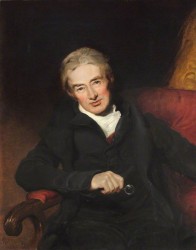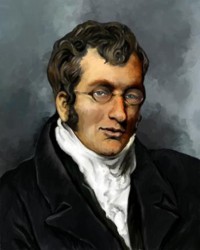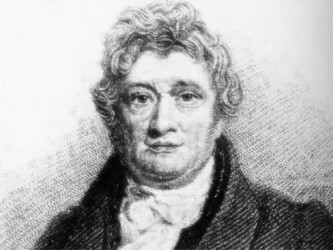This is an edited version of an article which was first published by Stabroek News on July 9, 1988 under the rubric of the A.J.McR. Cameron column.
In 1787 a group of twelve men, including Thomas Clarkson and Granville Sharp formed the Abolition Committee, with the long-term view of securing the abolition of slavery in the British colonies.
The tactics on which they decided were to try and get the Slave Trade abolished first, and thereafter move on to the question of slavery itself.
This committee became the nucleus of the subsequent Abolition Society, which launched the first and most sustained mass propaganda campaign of modern times. As everyone is aware the Slave Trade was abolished in due course in 1807. Thereafter there was a lull in the movement until the 1820s.

Even then, the old abolitionists committed themselves only to a policy of “gradual emancipation.” They were to be challenged on this matter by a new generation of abolitionists, who hardly remembered the early campaigns against the Slave Trade.
When the Emancipation Act finally came into effect in 1834, it inaugurated a period of apprenticeship for slaves — six years for field slaves and four years for the others. The final emancipation of the field slaves in 1838, which curtailed their apprenticeship by two years, did not come from the British Parliament at all, but from the individual colonial legislatures.
Wilberforce
Over the years the whole abolitionist campaign has become indelibly associated with the name of one man — William Wilberforce.
Born in Hull, Yorkshire in 1759, and endowed with a sickly constitution, he nevertheless contrived to live on into old age. He died in July 1833, a month before the Emancipation Bill was passed.
He was not one of the founders of the Abolition movement, he was instead recruited by them to lead their parliamentary campaign in 1789. His great oratorical skills aside, one of his main credentials for the task was the fact that he was a personal friend of the then Prime Minister, William Pitt. It was this, possibly, that recommended him so strongly to the abolitionists.
If they believed that this would have made their task easier in Parliament, they were possibly mistaken. The radical wing of the movement was to come to regret Wilberforce’s connections to the power elite, which they felt had made him dilatory in prosecuting the cause. George Stephen, for example, accused him of having “too much deferential regard for rank and power,” while others suggested more spitefully that it was so important to him to be well thought of, that it interfered with his judgement.

Stephen also described him as a man of “busy indolence,” while the essayist, Hazlitt, who stopped short of calling him a hypocrite, nevertheless branded him as fine a specimen of moral equivocation as can well be conceived.
Wilberforce’s sanctimoniousness obvious to any modem historian, also irritated some of his contemporaries. He perceived himself as very much the leader in a moral crusade, which encompassed such things as drinking, swearing, sensuality, and worst of all, sabbath breaking. Thomas Clarkson remarked that Wilberforce “cared nothing about the slaves…. provided he saved his own soul.” The accusation is not without foundation. Wilberforce was part of the evangelical movement whose central concern was with ‘sin’ in all its forms.
Trading in human beings was sinful, and condemned not merely the individual who participated in it, but also the nation which facilitated it. Wilberforce’s emphasis, therefore, was on the soul of the sinner, rather than on the suffering of his victim.
In addition, he was in no undue hurry for total emancipation following on the Abolition of the Slave Trade in 1807. When gradual emancipation was first proposed in the House by Earl Percy in 1807, Wilberforce opposed it. First, he insisted, the slaves would have to be made ‘fit’ for emancipation. It was an argument that would immobilize the movement for years to come. It was still being advanced as late as the debate on the Emancipation Bill in 1833, until the Irish MP Daniel O’Connell remarked drily, “Men who can bear slavery most assuredly offer a very strong presumption that they can bear freedom.”
Wilberforce’s main concern in the immediate post 1807 era, was with the “moral education” of the enslaved, not with their freedom. In 1823 he wrote that of all the evils of slavery, the worst was the almost total absence of “religious and moral instruction.”
At the same time, he exhorted his readers when condemning slavery, to view with “candour and tenderness” the slave-holders who engaged in it. It is to him too that the dubious credit goes for suggesting to the House in 1823 that the planters might possibly receive some form of compensation for their loss of slave labour in the event of emancipation.
Wilberforce’s reputation has eclipsed all others in the movement. His sons, in particular, were accused of deliberately over-stressing his role, and diminishing that of everyone else in their biography of their father. The person whom many felt had lost out in this process was Thomas Clarkson.
Clarkson himself was immensely irritated by the biography, and actually published a reply in which he stated that the Abolition Committee would have been founded and would have operated in the same way even if Wilberforce had never been there at all, the only difference would have been that someone else would have led the campaign in Parliament.
Clarkson had been the leading light in the formation of the first Abolition Committee in 1787, and became in effect its main researcher, travelling to slave-trading ports like Liverpool, collecting the information which the abolitionists and Wilberforce himself were to use later as ammunition in their campaign.
Perhaps those most overlooked in the metropolitan story, however, are the Quakers, whose contribution to the movement Clarkson, for one, willingly conceded. They had been the first to bring a petition to Parliament for the abolition of the Slave Trade in 1783, and contributed ten of the original twelve members of the Abolition Committee set up in 1787.

Not only did they display a certain consistency of approach over the years, but they also supplied some of the leading radicals of the movement. In 1830, it was Quakers like Emmanuel and Joseph Cooper and Joseph Sturge who pushed for immediate abolition, while the old generation of abolitionists was still dallying.
In concert with non-Quaker radicals like George Stephen, they set up what they called ‘Agency Committees,’ to resuscitate and invigorate the anti-slavery societies and disseminate as much information as possible. Their instructions to their agents were not to over-emphasise the brutality of the system, because mitigation of its cruelties was not the issue. The point was that the system of slavery itself — no matter what its form — was immoral, and should he made illegal.
The young radicals in general, Quaker or not, have largely been by-passed in the earlier historical accounts. Not only did they set the pace of the movement in the 1830s, but they refused to entertain any argument about the enslaved being made “fit” for emancipation, and bitterly opposed any compensation for the West Indian planters.
Another metropolitan group whose contribution was ignored by the official accounts of the 19th century, although recognized by radicals like Stephen, was that of women. Wilberforce himself was opposed to having women in the movement, and attempted to prevent any mention of their efforts being made in the abolitionist newspaper.
Women, who at first had been excluded from attending Abolition Society meetings, were generally more radical than Wilberforce and his group, and were not averse to criticising him publicly. In the 1820s, Elizabeth Coltman, one of their leaders, launched into an attack on both Wilberforce and Buxton and their gradualist approach to emancipation. It did not endear the sex to the conservative males of the movement.
It should also be remembered that a few of the early members of the movement were African. One of the Society’s best-known public speakers was Olaudah Equiano, an Ibo, who had himself once been enslaved and who has left us one of the very few accounts of the Middle Passage from the slave’s point of view.
The second most famous name after Wilberforce associated with abolition is that of Thomas Buxton. He took over the parliamentary leadership of the campaign after Wilberforce became too old. Unlike Wilberforce he was not a particularly good orator, but apart from that his approach was identical. He had friends in power, and did not push the issue relentlessly. Stephen was singularly unimpressed by him, claiming that his only real interests in life were horses and guns.
For all of that, it was Buxton whose name has become linked with the Emancipation Act, just as Wilberforce’s is with the Abolition of the Slave Trade.




